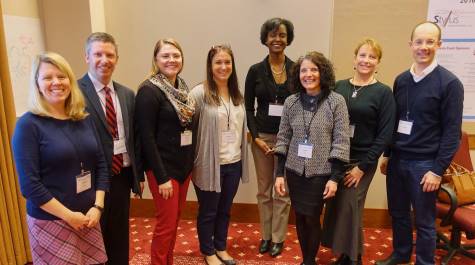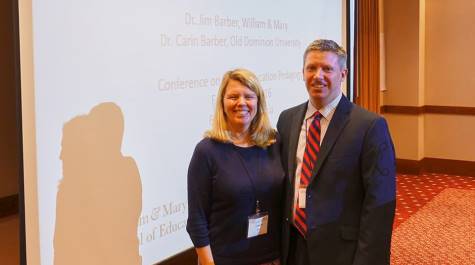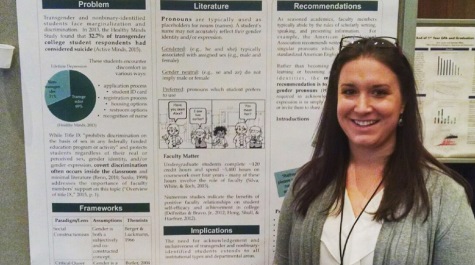William & Mary Represented at Teaching and Learning Conference
Sessions provided attendees with a variety of pedagogical topics from which to choose. Assistant Professor Stephanie Blackmon shared, “I was particularly excited about the sessions related to online teaching and learning. For example, there was a great session on the help seeking strategies of online students. The online teaching and learning sessions provided by William & Mary faculty, staff, and students were excellent as well: April Lawrence and Jamison Miller’s session for those interested in discussing online teaching and Pam Eddy and Kristen Tarantino’s session on co-teaching, which will have particular implications for the School of Education’s College Teaching Certificate program and other fully online programs that want to incorporate co-teaching.”
Several students and faculty made use of the conversation format for presenting in which smaller groups of attendees could engage more deeply with a particular topic. Educational Policy, Planning, and Leadership (EPPL) Higher Education doctoral student Jamison Miller collaborated with Curriculum and Educational Technology doctoral candidate April Lawrence on a conversation session about Bridging Pedagogical Freedoms and Bureaucratic Realities in Online Course Design. The session engaged other conference attendees in a conversation about the tensions between the structural approach required by online course design and the learner-centered self-directed pedagogy often used by faculty.
Professor Pamela Eddy and EPPL Higher Education doctoral candidate Kristen Tarantino conducted a conversation session titled Conversation: Co-Teaching as a Learning Experience. Focused on dialogue regarding how co-teaching can create a learning experience for both co-instructors and how this learning influences teaching, participants were able to share their questions and experiences about co-teaching and learn from presenters’ experiences.
EPPL Higher Education doctoral student Amanda Armstrong led a conversation session titled Conversation: Developing a Student-Conscious Syllabus. Participants explored the idea of creating a student-conscious syllabus that incorporates self-directed and autonomous learning for students regardless of their discipline or status in college. Armstrong also presented her poster Ask Them: Preferred Gender Pronouns in the Classroom. Her poster outlined the effects of acknowledging, or not acknowledging, preferred gender pronouns, the best practices for asking students which pronouns they prefer to use for themselves, and the ways in which faculty can promote inclusivity for students who identify as non-binary.
Amanda Armstrong reflected on her experience at the conference, “This was my second year attending CHEP and it won't be my last! It's been a pleasure to find a conference dedicated to the scholarship of teaching and learning where a diversity of disciplinary faculty, undergraduate and graduate students, and higher education professionals can come together and share resources. For those of us at W&M, this annual conference is a gem and I'd encourage others to attend next February.”
Other presentations included:
• Pedagogical Strategies: Addressing Anxiety in the College Classroom. A poster presented by EPPL Higher Education doctoral student Madeline Smith examining instructional strategies, designed to be adaptive for immediate implementation across disciplines, which can address various forms of student anxiety.
• Developing Global-Mindedness through Comparative Curricula. A poster presented by EPPL Higher Education doctoral candidate Kristen Tarantino reporting preliminary study results on whether students’ global-mindedness increased as a result of participating in a comparative education course.
• Lessons Learned in Creating an Online College Teaching Certificate. A collaborative session by Professor Pamela Eddy, Associate Professor Jim Barber, EPPL Curriculum and Educational Technology doctoral student April Lawrence, and EPPL Higher Education doctoral student Jamison Miller that reviewed the creation process involved in developing an online certificate program, how courses were evaluated, and what was learned by faculty in the process.
• Assessing Student Learning Environments. A joint session by EPPL Higher Education faculty members Jim Barber and Carin Barber that explored the importance of the environment in which learning occurs and identified multiple methods to assess those environments including surveys, focus groups, personal interviews, and structured observations.
In addition to faculty and student attendees, CHEP was also well attended by staff in the Technology Integration Center at the School of Education as well as from College’s Office of the Associate Provost for University eLearning Initiatives (APeL).
EPPL Curriculum and Educational Technology doctoral candidate and Senior Academic Technology Specialist for Social Sciences Adam Barger commented, “I was impressed by the various perspectives and backgrounds represented at CHEP. Sessions on faculty experiences were especially valuable as we learned about the challenges inherent in teaching higher education and the unique solutions offered by presenters.”
April Lawrence who works in the SOE Technology Integration Center and is a current EPPL Curriculum and Educational Technology doctoral candidate concurred, “CHEP provided us with an opportunity to have real discussions with colleagues from other institutions who support teaching and student learning. We learned that while context is important, faculty and staff at peer institutions face similar challenges and opportunities. It's a great conference for exchanging ideas and promising practices."
Lessons learned and shared at CHEP make their way directly back into the William & Mary classroom. Of note, several of the presentations are student products from their participation in the online College Teaching Certificate offered in EPPL.


